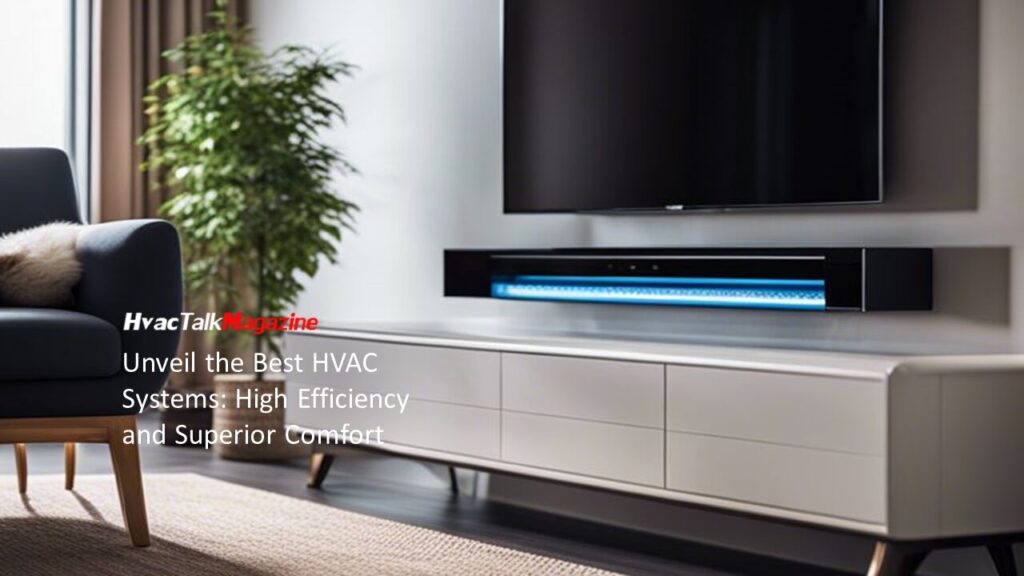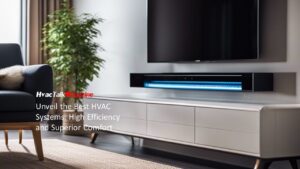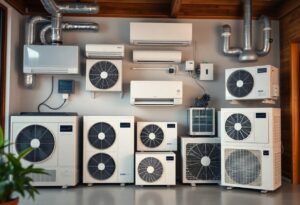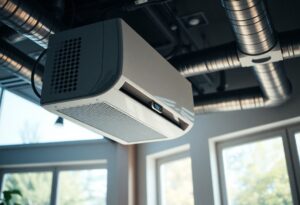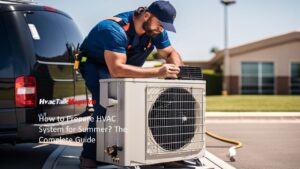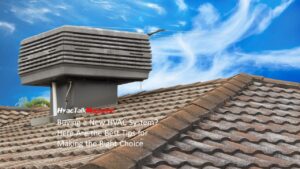Unveil the Best HVAC Systems: High Efficiency and Superior Comfort
Are you tired of feeling like your home is an oven in the summer and a freezer in the winter? Do skyrocketing energy bills have you searching for a more efficient solution? Look no further! In this article, we’ll guide you through the process of selecting the best HVAC systems for your needs, ensuring superior comfort and significant energy savings. From understanding different types of systems to exploring the latest innovations, we’ll provide you with the expert knowledge you need to make an informed decision and transform your home into a cozy oasis.
Key Takeaways:
- High-Efficiency Systems: Look for the best HVAC systems with high SEER (Seasonal Energy Efficiency Ratio) ratings, which can save you money on energy bills and reduce your carbon footprint.
- Inverter Technology: Inverter-driven best HVAC systems provide superior comfort by maintaining a consistent temperature, reducing humidity, and minimizing energy consumption.
- Zoning Systems: Zoning systems allow you to control the temperature in different areas of your home, providing Customized Comfort and increased energy efficiency.
- Air Purification: High-efficiency best HVAC systems often come equipped with advanced air purification features, improving indoor air quality and promoting a healthier living environment.
- Smart Thermostats: Smart thermostats can learn your schedule and preferences to optimize your HVAC system’s performance, providing Optimized Energy Savings and enhanced comfort.
- Durable and Low-Maintenance: High-efficiency best HVAC systems are designed to last longer and require less maintenance, reducing the need for frequent repairs and replacements.
- Government Incentives: Many governments offer incentives and rebates for homeowners who install high-efficiency HVAC systems, making it more affordable to upgrade to a superior comfort system.
What to Look for in a High-Efficiency BEST HVAC System
To ensure you get the best HVAC systems, it’s vital to know what features to look for. High-efficiency HVAC systems can provide superior comfort while reducing your energy bills.
Best HVAC Systems: Energy Star Certification
Any high-efficiency HVAC system worth considering should have the Energy Star certification. This certification is awarded by the U.S. Environmental Protection Agency (EPA) to products that meet strict energy efficiency guidelines. Look for the Energy Star logo when shopping for the best HVAC systems, as it ensures the product has been tested and certified to provide energy savings. When you choose an Energy Star-certified HVAC system, you can expect to save up to 20% on your energy bills compared to traditional systems. Additionally, these systems are designed to reduce greenhouse gas emissions, making them a more environmentally friendly option.
Best HVAC Systems: SEER and AFUE Ratings
SEER (Seasonal Energy Efficiency Ratio) and AFUE (Annual Fuel Utilization Efficiency) ratings are crucial metrics to consider when evaluating the efficiency of an HVAC system. SEER measures the system’s cooling efficiency, while AFUE measures its heating efficiency. A higher SEER and AFUE rating indicates a more efficient system, which can lead to significant energy savings over time. When evaluating SEER and AFUE ratings, look for systems with high numbers. For example, a SEER rating of 20 or higher is considered high-efficiency, while an AFUE rating of 90 or higher is excellent. Plus, keep in mind that a higher SEER and AFUE rating often translates to a more expensive upfront cost. However, the long-term energy savings can make up for the initial investment.
Best HVAC Systems: Inverter Technology
Certification from organizations like AHRI (Air-Conditioning, Heating, Refrigeration Certification Board) or UL (Underwriters Laboratories) can ensure that an HVAC system’s inverter technology meets industry standards. Inverter technology allows the system to adjust its compressor speed to match your cooling or heating needs, providing precise temperature control and increased energy efficiency. When shopping for an HVAC system with inverter technology, look for features like variable-speed compressors and advanced sensors that optimize system performance. Ratings from reputable organizations can give you peace of mind, knowing that the system has been tested and certified to provide superior performance and efficiency.
Types of Best HVAC Systems for Superior Comfort
Little do you know, there are various types of best HVAC systems designed to provide superior comfort and high efficiency. Pertaining to choosing the right system for your home or office, understanding the different types is crucial. Here are some of the most common types of HVAC systems:
- Split Systems
- Packaged Systems
- Ductless Mini-Split Systems
- Heat Pumps
- Geothermal Systems
| Type of System | Description |
| SPLIT SYSTEMS | Air handler or furnace inside, condenser outside |
| PACKAGED SYSTEMS | All components in one unit, usually on the roof or ground |
| DUCTLESS MINI-SPLIT SYSTEMS | Individual units for each room, no ductwork required |
| HEAT PUMPS | Reverses refrigeration cycle to heat or cool |
Knowing the differences between these systems will help you make an informed decision when selecting the best HVAC system for your needs.
Best HVAC Systems: Split Systems
Split systems are popular choices for homeowners who want traditional HVAC systems. These systems consist of an air handler or furnace installed inside, while the condenser is located outside. This setup allows for efficient heating and cooling, while also providing a quieter operation.
One of the advantages of split systems is their flexibility. They can be installed in a variety of configurations, making them suitable for homes with unique layouts or architectural designs. Additionally, split systems are often more energy-efficient than other types of HVAC systems, which can lead to significant savings on your energy bills.
Best HVAC Systems: Packaged Systems
Systems like packaged systems are ideal for homes or offices with limited space. These self-contained units house all the necessary components, including the compressor, coil, and fan, in a single cabinet. This design makes them perfect for rooftop or ground-level installations.
Packaged systems are known for their ease of installation and maintenance. Since all the components are housed in one unit, repairs and replacements are simplified, reducing downtime and costs. Moreover, packaged systems are often more affordable than split systems, making them a cost-effective option for many homeowners.
Types of packaged systems include gas/electric, heat pump, and hybrid models, offering a range of options to suit different needs and budgets.
Best HVAC Systems: Ductless Mini-Split Systems
Systems like ductless mini-split systems are perfect for homes or offices with unique layouts or where traditional ductwork is not feasible. These systems consist of individual units installed in each room, which can be controlled independently to provide precise temperature control.
Ductless mini-split systems are highly energy-efficient and can be up to 40% more efficient than traditional HVAC systems. They are also quieter and more compact, making them ideal for homes with limited space. Additionally, ductless mini-split systems are easy to install and require minimal maintenance, reducing downtime and costs.
The flexibility of ductless mini-split systems makes them suitable for a wide range of applications, from new constructions to retrofits and historic buildings.
Best HVAC Systems: Key Features for Enhanced Comfort
Many homeowners prioritize comfort when selecting the best HVAC systems, and for good reason. A comfortable home is crucial for relaxation and overall well-being. To achieve superior comfort, look for the following key features in your HVAC system:
- Zoned Heating and Cooling: This feature allows you to control the temperature in different areas of your home, ensuring that each room is at your desired temperature.
- Variable Speed Compressors: These compressors adjust their speed to match your cooling or heating needs, providing consistent and efficient performance.
- High-Efficiency Coils: Designed to maximize heat transfer, these coils ensure that your system operates at peak efficiency.
- Silent Operation: Look for systems with sound-reducing features, such as insulated cabinets or silent fan modes, to minimize disruptions.
- Humidity Control: This feature helps maintain a comfortable humidity level in your home, preventing moisture buildup and related issues.
- Air Purification: Integrated air purification systems can significantly improve indoor air quality, reducing allergens and pollutants.
- Smart Thermostats: These advanced thermostats learn your schedule and preferences to optimize your system’s performance and energy efficiency.
After considering these key features, you’ll be well on your way to selecting an HVAC system that provides superior comfort and efficiency.
Best HVAC Systems: Humidity Control
The ideal humidity level in your home is between 30% and 60%. If the air is too humid, it can lead to mold growth and moisture damage. On the other hand, dry air can cause discomfort and respiratory issues. A humidity control feature ensures that your HVAC system maintains a comfortable humidity level, preventing these issues.
By controlling humidity, you can also reduce energy consumption and prolong the lifespan of your system. Additionally, humidity control can help eliminate musty odors and reduce the risk of pest infestations.
Best HVAC Systems: Air Purification
Any homeowner concerned about indoor air quality should consider an HVAC system with integrated air purification. These systems can capture up to 99.97% of particles as small as 0.3 microns, including dust, pollen, and other allergens.
Air purification is especially important for households with pets or allergies. By removing pollutants and allergens from the air, you can breathe easier and enjoy a healthier living environment.
This advanced feature can also help reduce odors and VOCs (volatile organic compounds), creating a fresher and more comfortable indoor environment.
Best HVAC Systems: Smart Thermostats
Smart thermostats are designed to learn your schedule and preferences, optimizing your HVAC system’s performance and energy efficiency. With features like geofencing and smart scheduling, these thermostats can adjust the temperature when you’re away or sleeping, saving you energy and money.
Plus, many smart thermostats can be controlled remotely, allowing you to adjust the temperature from your phone or tablet. This feature is especially useful when you’re away from home and want to ensure your system is running efficiently.
With a smart thermostat, you can enjoy enhanced comfort and energy efficiency, while also reducing your environmental impact.
Best HVAC Systems: Factors Affecting HVAC System Efficiency
All HVAC systems are not created equal, and their efficiency can be significantly impacted by various factors. Understanding these factors is crucial in selecting the best HVAC systems for your needs and ensuring superior comfort and high efficiency.
Some of the key factors affecting HVAC system efficiency include:
- Insulation and Ductwork
- Window Orientation and Shading
- Building Envelope
- Cooling and Heating Loads
- System Sizing and Design
- Maintenance and Repair
Best HVAC Systems: Insulation and Ductwork
Factors such as inadequate insulation and poorly designed ductwork can significantly reduce the efficiency of your HVAC system. Proper insulation helps to reduce heat gain during the summer and heat loss during the winter, while well-designed ductwork ensures that cooled or heated air is distributed evenly throughout your home.
Inadequate insulation can lead to heat loss of up to 30%, resulting in increased energy bills and reduced comfort. On the other hand, a well-insulated home can help you save up to 30% on your energy bills.
Best HVAC Systems: Window Orientation and Shading
Factors such as window orientation and shading can also impact the efficiency of your HVAC system. Windows that receive direct sunlight can cause heat gain, increasing the load on your cooling system, while windows that are shaded can reduce heat gain and minimize the need for cooling.
Another important consideration is the type of windows you have. Energy-efficient windows with low e-coatings and double-pane glass can help reduce heat gain and minimize the need for cooling.
For instance, windows with a southern orientation can receive up to 40% more solar radiation than windows with a northern orientation, resulting in increased heat gain and energy consumption.
Best HVAC Systems: Building Envelope
On the surface, the building envelope may seem like a minor factor, but it plays a critical role in determining the efficiency of your HVAC system. The building envelope includes the walls, floors, and ceilings of your home, and its design and construction can significantly impact heat gain and loss.
Find and Post Jobs on the HvacJobsCenter
Find a Job in HVAC
A well-designed building envelope can help reduce heat gain and loss, minimizing the load on your HVAC system and reducing energy consumption. For instance, a building envelope with R-19 insulation can help reduce heat loss by up to 90%.
Knowing these factors can help you make informed decisions when selecting an HVAC system, ensuring that you get the best system for your needs and enjoy superior comfort and high efficiency.
Best HVAC Systems: Comparing Top Brands and Models
Unlike what you might think, choosing the best HVAC systems isn’t just about picking a brand or model. It’s about understanding your specific needs and finding the perfect fit. To help you make an informed decision, we’ve compiled a comparison of top brands and models.
| Brand | Model |
|---|---|
| Carrier | Infinity 26 |
| Bryant | Evolution 987M |
| Trane | XV20i |
| American Standard | AccuComfort Platinum 20 |
| Lennox | SLP98V |
| Rheem | Prestige Series RA17 |
Carrier and Bryant
Carrying a reputation for reliability and efficiency, Carrier’s Infinity 26 and Bryant’s Evolution 987M are top contenders in the HVAC market. Both models boast high SEER ratings, with the Infinity 26 reaching up to 26 SEER and the Evolution 987M reaching up to 20.5 SEER. These systems are designed to provide superior comfort and **energy savings**, making them ideal for homeowners who want to reduce their energy bills. As far as noise levels, both models are designed to operate quietly, with the Infinity 26 featuring a **Silencer System** that reduces sound levels by up to 50%. Additionally, both models come with advanced features like Wi-Fi connectivity and smart home integration, allowing you to control your HVAC system remotely.
Trane and American Standard
One of the most notable features of Trane’s XV20i and American Standard’s AccuComfort Platinum 20 is their ability to maintain a consistent temperature throughout your home. These models feature advanced compressor technology that allows for precise temperature control**, ensuring that your home remains comfortable even in extreme weather conditions. These systems also boast high SEER ratings, with the XV20i reaching up to 22 SEER and the AccuComfort Platinum 20 reaching up to 22 SEER. Additionally, both models come with features like humidity control and air purification, making them ideal for homeowners who suffer from allergies or respiratory issues. This level of precision and control is unmatched in the industry, making these models stand out from the competition. Check out too, Trane American Standard Accessories.
Lennox and Rheem
Trane-like in their commitment to innovation, Lennox’s SLP98V and Rheem’s Prestige Series RA17 are designed to provide superior comfort and efficiency. Both models feature advanced heat pump technology that allows for efficient heating and cooling, even in extreme temperatures. As far as noise levels, both models are designed to operate quietly, with the SLP98V featuring a silent operation mode that reduces sound levels by up to 50%. Additionally, both models come with features like Wi-Fi connectivity and smart home integration, allowing you to control your HVAC system remotely. For instance, the SLP98V features a **precise temperature control system that allows for customized temperature settings, ensuring that your home remains comfortable throughout the day. Check for guidance on the Lennox and Rheem Accessories too.
Best HVAC Systems: Installation and Maintenance Considerations
After selecting the best HVAC systems for your homes, it’s crucial to consider the installation and maintenance aspects to ensure optimal performance and longevity.
Best HVAC Systems: Proper Sizing and Installation
The correct installation of your HVAC system is crucial to its overall performance and efficiency. A system that is too small or too large for your home can lead to inefficient energy consumption, increased energy bills, and reduced system lifespan. You should hire a professional technician to assess your home’s specific heating and cooling needs and install the system accordingly. Additionally, ensure that your technician follows the manufacturer’s instructions and industry standards for installation. Proper installation also involves ensuring that the system is correctly configured, and all components are properly connected. This includes the ductwork, vents, and electrical connections. A well-installed system will provide you with superior comfort, improved indoor air quality, and reduced energy costs.
Best HVAC Systems: Regular Maintenance Schedules
To keep your HVAC system running efficiently and effectively, it’s crucial to establish a regular maintenance schedule. This includes tasks such as inspecting and cleaning the condenser coils, checking refrigerant levels, and lubricating moving parts. Regular maintenance can help prevent costly repairs, reduce energy consumption, and extend the system’s lifespan. You should aim to perform routine maintenance tasks at least twice a year, once before the heating season and once before the cooling season. Another crucial aspect of regular maintenance is identifying potential issues before they become major problems. By catching minor issues early, you can avoid expensive repairs, reduce downtime, and ensure continuous comfort. Regular maintenance schedules can also help you identify opportunities to improve your system’s performance and efficiency. By analyzing your system’s performance data, you can make informed decisions about upgrades or replacements, ensuring that your system continues to provide you with superior comfort and energy efficiency.
Best HVAC Systems: Filter Replacement and Cleaning
Considerations for filter replacement and cleaning are often overlooked, but they play a critical role in maintaining your HVAC system’s performance and indoor air quality. Dirty filters can reduce airflow, increase energy consumption, and even cause system failure. You should replace your filters every 1-3 months, depending on usage and the manufacturer’s recommendations. Additionally, cleaning your system’s coils and fans can also improve performance and efficiency. A clean system can provide you with better indoor air quality, reduced energy consumption, and improved overall comfort. It’s crucial to follow the manufacturer’s guidelines for filter replacement and cleaning to ensure that you’re doing it correctly. Improper cleaning or replacement can damage your system and lead to costly repairs or even system failure.
Tip of the Day
Upgrade your home comfort with the best HVAC systems available! Discover top-rated, energy-efficient solutions for year-round climate control.
👉 Shop now and choose the perfect HVAC system for your needs. Enhance your home’s comfort and efficiency today!
Best HVAC Systems: To wrap up
Presently, you’re equipped with the knowledge to make an informed decision when it comes to selecting the best HVAC systems for your homes or offices. By considering factors such as energy efficiency, noise levels, and advanced features, you can ensure that your new system provides superior comfort while also saving you money on your energy bills. Note, that a high-efficiency HVAC system is not just a luxury, but a necessity in today’s eco-conscious world.
As you begin on your journey to unveil the best HVAC system for your needs, keep in mind that your choice will have a lasting impact on your indoor air quality, energy consumption, and overall well-being. By prioritizing your comfort and the environment, you’ll be rewarded with a system that not only performs exceptionally but also provides long-term benefits. So, take the first step today, and discover the perfect HVAC system that meets your unique requirements and exceeds your expectations.
Best HVAC Systems: FAQ
Q: What are high-efficiency HVAC systems, and how do they benefit my home?
A: High-efficiency HVAC (heating, ventilation, and air conditioning) systems are designed to provide superior comfort while minimizing energy consumption. These systems use advanced technology and materials to optimize performance, resulting in significant energy savings, reduced utility bills, and a smaller carbon footprint. By choosing a high-efficiency HVAC system, you can enjoy a more comfortable living space while also contributing to a more sustainable future.
Q: What factors should I consider when selecting the best HVAC systems for my home?
A: When choosing an HVAC system, consider factors such as your home’s size, insulation, and climate. You should also think about your budget, desired level of comfort, and any specific features you need (e.g., zoning, air purification, or smart home integration). Additionally, look for systems with high SEER (Seasonal Energy Efficiency Ratio) and AFUE (Annual Fuel Utilization Efficiency) ratings, as these indicate better energy efficiency. It’s also crucial to work with a qualified HVAC professional to ensure proper installation and maintenance.
Q: How do I determine the right size of HVAC system for my home?
A: Sizing an HVAC system correctly is crucial for optimal performance, efficiency, and comfort. A system that’s too small won’t heat or cool your home effectively, while one that’s too large will waste energy and increase costs. To determine the right size, consider factors such as your home’s square footage, number of windows, insulation levels, and local climate. A professional HVAC technician can perform a load calculation to determine the ideal system size for your specific needs.
Q: What are some common types of high-efficiency HVAC systems, and how do they compare?
A: Some popular types of high-efficiency HVAC systems include inverter-driven systems, dual-fuel systems, and heat pumps. Inverter-driven systems use advanced technology to modulate compressor speed, providing precise temperature control and increased efficiency. Dual-fuel systems combine a gas furnace with a heat pump, offering flexibility and improved performance. Heat pumps, which transfer heat rather than generate it, are highly efficient and environmentally friendly. Each type has its advantages and disadvantages, so it’s crucial to consult with an HVAC expert to determine the best fit for your home and climate.
Q: Can I install a high-efficiency HVAC system myself, or do I need professional assistance?
A: While it may be tempting to try installing an HVAC system yourself, it’s highly recommended to hire a professional HVAC technician. Proper installation is critical for safety, efficiency, and performance. A licensed technician will ensure that your system is installed correctly, meets local building codes, and is optimized for your specific needs. Additionally, many manufacturers require professional installation to validate warranties, so DIY installation may void your warranty.
Q: How often should I maintain my high-efficiency HVAC system to ensure optimal performance?
A: Regular maintenance is crucial to keep your high-efficiency HVAC system running at its best. Schedule annual tune-ups with a qualified technician to inspect and clean your system, replace filters, and address any potential issues. Additionally, perform routine tasks such as cleaning outdoor units, checking thermostat settings, and replacing air filters every 1-3 months. By staying on top of maintenance, you’ll enjoy improved comfort, reduced energy bills, and extended system lifespan.
Q: Are there any rebates or incentives available for high-efficiency HVAC systems?
A: Yes, there are various rebates and incentives available for high-efficiency HVAC systems. Many utility companies, government agencies, and manufacturers offer discounts, tax credits, or rebates for energy-efficient upgrades. These incentives can help offset the initial cost of a high-efficiency system, making it more affordable and increasing your return on investment. Be sure to research and explore available incentives in your area before making a purchase. Learn more and join our mailing list for updates.
Follow Us on Google Chrome
To get started, Switch to Google Chrome Browser
1. Already on our site
2. Top right, tap the 3 dots
3. Bottom right, tap follow
4. You are done.
This post has been written by Team HVAC Talk Magazine. Stay informed and connected with the latest in HVAC—join us for expert advice, troubleshooting tips, and news updates. Don’t miss out, follow us now! #HVACExperts #HVACTips #StayInformed #HVACProTalk.
